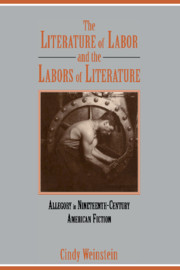 The Literature of Labor and the Labors of Literature
The Literature of Labor and the Labors of Literature Published online by Cambridge University Press: 06 July 2010
Like Melville, Twain imagined the scene of writing to be inextricably connected to the scene of industrial production. And like Melville, Twain imagined that the act of inventing fictional characters for a literary economy was analogous to the act of producing laborers for a market economy. The relation between these scenes of production was even more vexed for Twain than for Melville. Twain in his capacity as entrepreneur continually shuttled back and forth between the two scenes, inventing characters to populate his fictions and constructing laborers to operate the machines in which he had invested. The encounter between these two scenes of production is itself written into Twain's texts. After all, what is the Man-factory of A Connecticut Yankee in King Arthur's Court if not a site both of the manufacturing of persons for Hank's market economy and for Twain's literary economy?
It is the powerful and productive encounter between these two scenes of producing persons that this chapter analyzes in order to map out Twain's own relation to the work ethic as it applied to literary labor and to delineate the economics of Twain's allegory. Whereas Melville's texts destabilized conventional oppositions between work and leisure in order to install a new notion of literary labor, Twain's texts interrogate traditional relations between efficiency and inefficiency in order to suggest that literary labor, particularly humorous literary labor, is subject to different notions of efficiency.
To save this book to your Kindle, first ensure [email protected] is added to your Approved Personal Document E-mail List under your Personal Document Settings on the Manage Your Content and Devices page of your Amazon account. Then enter the ‘name’ part of your Kindle email address below. Find out more about saving to your Kindle.
Note you can select to save to either the @free.kindle.com or @kindle.com variations. ‘@free.kindle.com’ emails are free but can only be saved to your device when it is connected to wi-fi. ‘@kindle.com’ emails can be delivered even when you are not connected to wi-fi, but note that service fees apply.
Find out more about the Kindle Personal Document Service.
To save content items to your account, please confirm that you agree to abide by our usage policies. If this is the first time you use this feature, you will be asked to authorise Cambridge Core to connect with your account. Find out more about saving content to Dropbox.
To save content items to your account, please confirm that you agree to abide by our usage policies. If this is the first time you use this feature, you will be asked to authorise Cambridge Core to connect with your account. Find out more about saving content to Google Drive.